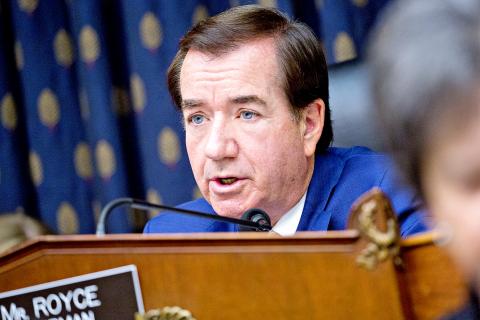The US House of Representatives on Thursday passed its annual defense spending bill for fiscal year 2019, which includes provisions to help strengthen Taiwan’s military capabilities.
The US$717 billion National Defense Authorization Act cleared the House 351-66.
Section 1253, titled “Strengthening Taiwan’s Force Readiness,” would direct the US secretary of defense to conduct a comprehensive assessment, in consultation with their Taiwanese counterparts, on ways to enhance and reform Taiwan’s military forces, particularly the reserve forces, the text of the bill published by the House says.

Photo: Bloomberg
The assessment would also require the development of recommendations to strengthen bilateral cooperation and improve Taiwan’s self-defense capabilities, it says.
The secretary of defense, in consultation with the US secretary of state, would be required to submit a report on the assessment and a list of recommendations and planned actions to the appropriate congressional committees no later than one year after the act is enacted, it says.
Section 1262, titled “Senior Defense Engagement with Taiwan,” would express the sense of US Congress that, pursuant to the Taiwan Travel Act, a service secretary or member of the US Joint Chiefs of Staff should visit Taiwan for senior-level defense engagement.
It would also require a briefing to the congressional defense and foreign affairs committees on any plans by the US Department of Defense to carry out senior-level defense engagement.
Separately on Thursday, several US lawmakers took to social media to express their concern and support for Taiwan after it lost another diplomatic ally, most likely because of China’s influence.
Burkina Faso earlier that day announced that it was severing diplomatic ties with Taiwan, citing “the interests of Burkina Faso and its people in the concert of nations,” Reuters reported.
US representatives Paul Gosar and Ted Yoho wrote in their posts that the US would stand with Taiwan in the face of Beijing’s pressure.
Gosar highlighted the nation’s virtues, calling it on Twitter “a strategic military and trade ally and a beacon in Asia,” and pledged to stand behind Taiwan and “its right to diplomatic relations.”
In addition to a message of support for Taiwan, Yoho also called out China for what he called its “two-faced aggression.”
He wrote that China’s minister of foreign affairs has said that the “US&China ‘should properly handle Taiwan,’” yet it continues to destabilize the Taiwan Strait with provocations, such as blocking Taiwan’s participation at this year’s World Health Assembly and poaching two of its allies in less than a month.
US Senator Marco Rubio said it was “regrettable Burkina Faso folded to China’s coercion and cut ties with Taiwan,” but warned that Beijing’s offers would come with strings attached, as it always puts its own authoritarian interests first.
House Committee on Foreign Affairs Chairman Ed Royce said on the committee’s Twitter account that he was “very concerned by concerted pressure campaign Taiwan is facing, including its exclusion from WHO.”
In response to the outpouring of support, Taiwan’s representative office in the US issued a statement expressing its thanks to Congress for its long-standing, firm support of the Taiwan-US friendship.

INVESTIGATION: The case is the latest instance of a DPP figure being implicated in an espionage network accused of allegedly leaking information to Chinese intelligence Democratic Progressive Party (DPP) member Ho Jen-chieh (何仁傑) was detained and held incommunicado yesterday on suspicion of spying for China during his tenure as assistant to then-minister of foreign affairs Joseph Wu (吳釗燮). The Taipei District Prosecutors’ Office said Ho was implicated during its investigation into alleged spying activities by former Presidential Office consultant Wu Shang-yu (吳尚雨). Prosecutors said there is reason to believe Ho breached the National Security Act (國家安全法) by leaking classified Ministry of Foreign Affairs information to Chinese intelligence. Following interrogation, prosecutors petitioned the Taipei District Court to detain Ho, citing concerns over potential collusion or tampering of evidence. The

‘FORM OF PROTEST’: The German Institute Taipei said it was ‘shocked’ to see Nazi symbolism used in connection with political aims as it condemned the incident Sung Chien-liang (宋建樑), who led efforts to recall Democratic Progressive Party (DPP) Legislator Lee Kun-cheng (李坤城), was released on bail of NT$80,000 yesterday amid an outcry over a Nazi armband he wore to questioning the night before. Sung arrived at the New Taipei City District Prosecutors’ Office for questioning in a recall petition forgery case on Tuesday night wearing a red armband bearing a swastika, carrying a copy of Adolf Hitler’s Mein Kampf and giving a Nazi salute. Sung left the building at 1:15am without the armband and apparently covering the book with a coat. This is a serious international scandal and Chinese

Seventy percent of middle and elementary schools now conduct English classes entirely in English, the Ministry of Education said, as it encourages schools nationwide to adopt this practice Minister of Education (MOE) Cheng Ying-yao (鄭英耀) is scheduled to present a report on the government’s bilingual education policy to the Legislative Yuan’s Education and Culture Committee today. The report would outline strategies aimed at expanding access to education, reducing regional disparities and improving talent cultivation. Implementation of bilingual education policies has varied across local governments, occasionally drawing public criticism. For example, some schools have required teachers of non-English subjects to pass English proficiency

TRADE: The premier pledged safeguards on ‘Made in Taiwan’ labeling, anti-dumping measures and stricter export controls to strengthen its position in trade talks Products labeled “made in Taiwan” must be genuinely made in Taiwan, Premier Cho Jung-tai (卓榮泰) said yesterday, vowing to enforce strict safeguards against “origin laundering” and initiate anti-dumping investigations to prevent China dumping its products in Taiwan. Cho made the remarks in a discussion session with representatives from industries in Kaohsiung. In response to the US government’s recent announcement of “reciprocal” tariffs on its trading partners, President William Lai (賴清德) and Cho last week began a series of consultations with industry leaders nationwide to gather feedback and address concerns. Taiwanese and US officials held a videoconference on Friday evening to discuss the